#illegal pet trade crackdown
Explore tagged Tumblr posts
Text
PETA and Forest Officials Rescue Protected Tortoises in Jamshedpur
Two Indian star tortoises seized from pet shop in joint operation PETA India and Dhalbhum Forest Division rescued two protected Indian star tortoises from an illegal sale at a Jamshedpur pet shop. JAMSHEDPUR – Following a tip-off, PETA India and the Dhalbhum Forest Division jointly rescued two Indian star tortoises from illegal sale at a Jamshedpur pet shop. The rescued tortoises are protected…
#Atlantic Aquarium Sonari#जनजीवन#Dhalbhum Forest Division#endangered species rescue#illegal pet trade crackdown#Indian star tortoise seizure#IUCN Red List species#Jamshedpur wildlife protection#Life#PETA India rescue operation#Wildlife Protection Act enforcement#wildlife trafficking prevention
0 notes
Text
New powers to tackle cruel puppy smuggling move step closer
New Post has been published on https://petnews2day.com/pet-industry-news/pet-travel-news/new-powers-to-tackle-cruel-puppy-smuggling-move-step-closer/
New powers to tackle cruel puppy smuggling move step closer
New plans to crack down on puppy smuggling and ban the import of dogs with cropped ears or docked tails have been set out by the UK Government today.
The new powers, which also include raising the minimum age for importing a puppy from 15 weeks to six months and banning the import of heavily pregnant dogs to help protect puppy and mother welfare, are aimed at safeguarding the welfare of the thousands of puppies and dogs that come into Great Britain from overseas each year.
More than 66,000 dogs were commercially imported into the UK last year according to Animal and Plant Health Agency figures. However, evidence shows a recent rise in low-welfare imports and smuggling activity, with border authorities seeing around a 260% increase in the number of young puppies being intercepted for not meeting the UK’s pet import rules – from 324 in 2019 to 843 in 2020.
The proposals are part of a raft of measures included in an eight-week GB-wide consultation which seeks views from the public and stakeholders on government proposals to tackle puppy smuggling and low-welfare imports by unscrupulous breeders and traders.
In addition, the consultation asks the public and stakeholders for views on new penalties for breaching these rules, changes to the detention and rehoming process and whether the proposals should be extended to cover cats and ferrets.
Launching the consultation, Animal Welfare Minister Lord Zac Goldsmith said:
Puppy smuggling is a grim trade, and we are determined to clamp down on it.
Raising the minimum import age for puppies will help protect thousands of animals that are brought into the country each year and stop criminals looking to profit from the rise in demand for pets.
We already have one of the toughest pet travel border checking regimes in the world and as an independent nation outside the EU we are going even further by preventing anyone from bringing in dogs which have undergone inhumane procedures such as ear cropping or tail docking.
These new measures build on our plans to raise animal welfare standards across the board as part of our Action Plan for Animal Welfare.
RSPCA chief executive Chris Sherwood said:
In recent years we’ve seen a huge increase in the number of dogs being commercially imported into the UK as well as the number of dogs being reported for having undergone mutilated procedures such as cropped ears.
These are major dog welfare issues that need addressing as a matter of urgency in order to protect dogs from unnecessary suffering and to protect the public from falling victim to criminals who are trying to cash in on these dogs’ value.
We’re really pleased that the Government – which pledged to tackle these issues among many others in its Action Plan for Animal Welfare – is launching this consultation and we hope that these new measures will be implemented efficiently so that we can crackdown on the illegal dog trade once and for all.
Owen Sharp, Chief Executive of Dogs Trust said:
We are delighted that today’s consultation could bring us one step closer to ending the abhorrent puppy smuggling trade. Over the last six years, Dogs Trust has spearheaded the campaign to crack down on puppy smuggling, after our first undercover investigation in 2014 exposed widespread abuse of the Pet Travel Scheme by unscrupulous dealers, bringing in puppies for sale.
Since setting up our Puppy Pilot in 2015 we have cared for more than 2000 puppies which were seized at UK borders, often in horrendous conditions. We have seen puppies as young as 4 weeks old being smuggled into the country and dogs with open wounds from ear cropping as well as heavily pregnant dogs close to giving birth.
We are pleased that the consultation has set out proposals to tackle these issues and hope it results in tougher penalties for these crimes, as currently only a handful of cases have ever been prosecuted and the existing penalties are sadly no deterrent. We will continue to work closely with the Government to be the voice for dogs and put forward our recommendations to ensure the proposed legislation effects real change.
Media vet, animal welfare campaigner, and founder of the Lucy’s Law and #BanPuppyImports campaigns, Dr Marc Abraham OBE says:
This important Government consultation is hugely welcome and will hopefully bring us another step closer to ending widespread cruelty to puppies and their parents. For decades, both the legal and illegal importation of young puppies has enabled and encouraged low-welfare breeding practices and dog exploitation across Europe, with puppies often separated from their mothers too early, then sent long distances often riddled with all kinds of disease, straight to their unsuspecting new owners in the UK.
By introducing these positive dog welfare proposals we can make significant progress in the fight against these cruel practices. I would like to thank the UK Government for listening to the evidence presented by campaigners and hope we can secure these positive changes needed to protect the puppies, their parents, and the British dog-owning public.
Puppies that are imported too young face a significantly higher risk of developing illnesses or even death.
Raising the minimum age for bringing puppies in to the UK will therefore ensure that they are not separated from their mothers too early and will allow them to develop further ahead of being taken on potentially long and stressful journeys which can have a lasting impact on their temperament and behaviour.
The RSPCA has also recently reported a 620% rise in reports of dogs found to have had their ears cropped, covering from 2015 to 2020. Ear cropping is a painful process where a dog’s outer ears are surgically altered or removed altogether to make them look more aggressive. The surgical procedure, which has been illegal in this country since 2006, can hinder their ability to communicate with other dogs and their owners.
The majority of these dogs are suspected to have undergone the procedure overseas and under the new rules set out in the consultation launched today they would be banned from entering the country.
Last year the Dogs Trust warned the public about the risk of buying dogs online after rescuing dozens of puppies that were illegally imported into the country. Victims of this cruel trade included a group of six underage puppies seized at Dover port after being found covered in sticky oil and suffering from diarrhoea. The puppies had been illegally imported from Romania and were travelling in the back of a van for more than 24 hours. They had to be shaved to remove the oil from their fur.
In September 2020, four beagle puppies were also found in the back of an abandoned vehicle in Greater London. At eight weeks old, they weighed just two kilograms each and were very hungry and dehydrated. They are believed to have been illegally imported from the Republic of Ireland, to be sold onto prospective buyers in the UK. After spending three weeks in the care of the Dogs Trust, they went on to loving new homes.
The proposals launched today build on the UK Government’s commitment to end the cruel practice of puppy smuggling and low welfare imports, as set out in the Government’s Action Plan for Animal Welfare and Animal Welfare (Kept Animals) Bill. The responses to the consultation will inform future government policy in this area, helping to deliver a manifesto commitment made in 2019.
The consultation can be found here.
0 notes
Note
Crocadog / crocadog species head canons?
[first: if you haven't seen em already, check out this post for general crocadog species headcanons + how they're kept in Spargus, and this one has a bit about Jak's crocapup post-II! – with these 4hc posts I'm trying not to repeat myself, so there's a lot more beyond this reply c:]
in Haven, crocadogs are classified as an ‘exotic pet’ and are prohibited within the city walls– due to the size they can reach when fully grown and their highly territorial nature, they really can't be kept as an indoor/domestic pet and need a lot of space to roam, which even the largest noble estates would have trouble providing.
naturally, this was a cause of concern for the Underground, but in the end they decided to let the Kid keep his crocapup�� bab!Jak was very attached to his pet and it kept him entertained during long hours in the hideout, and its presence was a strong deterrent against any attempt to attack/capture him (even juvenile crocas are vicious when threatened), both of which were very beneficial given the Kid's habit of running off and getting into trouble whenever he got bored. as long as the crocapup wasn't causing a problem (still small enough to be kept indoors & relatively well-behaved) Torn and Samos figured it wasn't worth worrying about.
there was a big crackdown on the illegal pet trade in Haven when Damas was a child, which was brought about after his parents discovered that he was trying to keep a crocapup as a pet (this was not his first secret pet attempt, but the previous ones had all been relatively small and harmless, which hadn't warranted a whole policy change). the King and Queen never did find out how he smuggled it into the palace in the first place, but they were determined to shut down any future attempts to keep ‘dangerous’ animals under his bed.
crocadogs have an excellent ability to identify humans they've bonded with, even after a long time has passed– so in renegade, Jak's crocapup was immediately calm/friendly around him because on a deep instinctive level it recognised him.
#jak and daxter#crocadogs#Haven City#Jak#Samos Hagai#Torn#Damas#world musings#backstory hc#scritches#duskglass#replies#request
41 notes
·
View notes
Text
Jamshedpur raid: 30 protected parrots rescued from illegal shop
Forest officials act on PETA tip, seize plum-headed and Alexandrine parakeets Jamshedpur Forest Department confiscates 30 protected parrots from unauthorized pet shop, highlighting ongoing wildlife trafficking concerns in the region. JAMSHEDPUR – Thirty protected parrots were rescued during a raid on an illicit pet shop in Sakchi by forest officials. The Jamshedpur Forest Department team…
#animal rights#जनजीवन#illegal pet trade crackdown#Jamshedpur forest department action#Life#parakeet conservation#PETA India alert#protected bird species#Sakchi illegal pet shop#Wildlife Protection Act enforcement#wildlife rescue operation#wildlife trafficking
0 notes
Text
Saving Myanmar’s Elephants
Please read this fantastic article written by guest blogger Ruth Powys, about Myanmar’s endangered elephants.
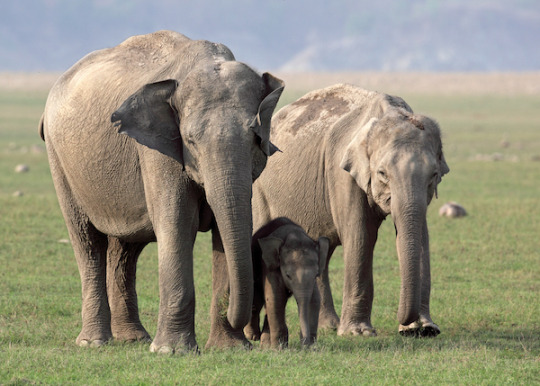
Saving Myanmar’s Elephants
By Ruth Powys
While a boom in the illegal ivory market is threatening the world’s African elephants, their lesser-known cousins across Asia are silently facing a similar fate.
The illegal trade in animals and their body parts has been going on for decades. Black markets have been brimming with pangolin scales; elephant ivory, tiger skins, rhino horns and exotic pets for years, but more recently, a new fad has been emerging as Asia’s elephants are being poached for their skin. Hidden in the dense forests, Myanmar’s elephants are witnessing a drastic decline as they succumb to this growing, illicit trade.
Ranked the fourth largest global illegal trade after drugs, arms and human trafficking, illegal wildlife trade is a sophisticated business with an even more sophisticated distribution network. Mong-La in northeast Myanmar, a protectorate area of China well-known for gambling, prostitution and illegal trade of wildlife products, is one of the main destinations where elephant ivory, bones and skin are sold.
Elephants are endangered across Asia, with only an estimated 40,000 remaining in the wild today – a 90% decline compared to a century ago. Myanmar retains some of the largest areas of habitat left for Asian elephants and possibly the third largest (yet declining) population of wild Asian elephants after India and Sri Lanka. The country now has as few as 2,000 wild elephants and 6,000 timber elephants left. It is estimated that if the current rate of poaching in the country continues, Myanmar’s elephant population could soon be completely wiped out.
In 2015 alone, 36 wild elephants were reported to have been killed, with experts believing that many poaching incidents went unnoticed. Last year, Elephant Family – an NGO dedicated to protecting the Asian elephant – funded one of the first ever undercover investigations across Myanmar and China to unravel the growing trade for elephant skin and make this issue known. The findings revealed that elephant poaching in Myanmar is indeed increasing, fuelled by the demand from neighboring China. The skin is cut up, dried and sold on the black market believed to ‘treat’ a number of ailments such as eczema and digestive problems. The investigation also revealed that the skin is being cut into cubes, dried and carved into polished beads for jewellery.
While elephant ivory remains the most valuable part of an elephant, the growing demand for elephant skin and other parts continues to drive up the demand for elephant poaching in Myanmar, further decimating its already fragile elephant population. This year alone, a herd of 20 elephant carcasses including calves, were found in two sites across Myanmar’s forest stripped off their skin.
But Elephant Family and its partners are determined to crackdown on poachers and stop the trade.
What can be done?
Last October, we presented our investigation findings at the CITES[1] Conference of Parties (CoP17) in Johannesburg to make this issue known, calling on range states to tighten procedures to stop trade. Our ongoing efforts were made visible when our calls to action were successfully incorporated and passed at the Convention.
Our next steps are to build the capacity of regional police, customs and wildlife officials within targeted countries in order to better detect and prosecute cross-border and wildlife trade. If Elephant Family can continue to secure a war chest of funds and carry out further investigations to establish the full extent of this abhorrent trade, we can invest in stronger intelligence and understand more clearly who is trafficking and supplying elephant products, allowing us to crackdown on end markets once and for all and sources fuelling the trade.
So this week, to commemorate World Elephant Day, let us shine a multi-coloured spotlight on Myanmar’s elephants to raise awareness and much needed funds for this little known yet growing trade -a threat that has never been greater.
Our combined efforts can help save Asia’s elephants and stop the trade from escalating up to the level of elephant ivory and rhino horn, while we still have time.
To find out more about the illegal trade in elephant skin and how you can help, visit http://elephant-family.org/what-we-do/campaigning/elephant-skin
[1] Convention on International Trade of Endangered Species

2 notes
·
View notes
Text
Illegal wildlife trade is one of the biggest threats to endangered species
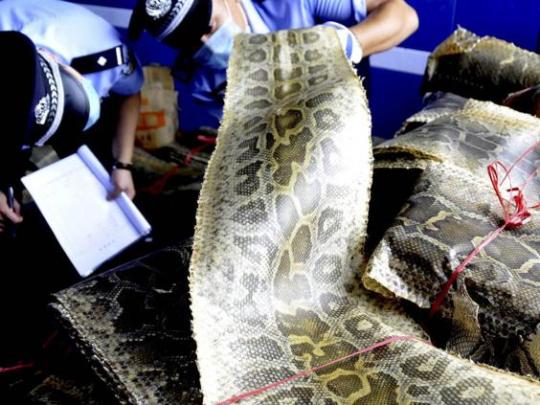
You might not have heard of a pangolin, but they are widely claimed to be the most illegally trafficked mammal in the world. With their armoured shells and long noses, pangolins are often called “scaly anteaters” because of their preferred diet. Much like the UK’s native hedgehog, when in danger, pangolins can roll into a ball – exposing only the tough scales for protection Earlier this year, Thai customs officials seized 136 live pangolins and 450kg of pangolin scales smuggled into the country from Malaysia. These scales, which were likely destined to be used in traditional Asian medicines, are worth around $75,000 (£56,000). econd to habitat loss, illegal trade of wildlife is considered the biggest threat to many endangered species. Although it is controlled by laws created by member countries of the Convention on International Trade in Endangered Species (Cites), illegal trade continues. And many species are now being pushed ever closer to extinction to satisfy huge demand for such things as medicines, collectables, pets and clothing. Not our problem? Earlier this year, the Natural History Museum announced Brent Stirton as its Wildlife Photographer of 2017 for his image Memorial to a Species, an evocative and distressing image of a slaughtered black rhino bull, horn hacked off by poachers, which was taken in Hluhluwe-Imfolozi Park, South Africa. But illegal wildlife trade isn’t just something that happens where the animals live – the UK is both an important transit and destination country for this type of trade. Between 2009 and 2014, the UK Border Force dealt with 257 confiscations, seizing nearly 3,000 items; including ivory, rhino horn and tiger products. The UK Government has made a clear commitment to support efforts to tackle the illegal wildlife trade. But although there are a few examples of excellent practice and of more recent initiatives – such as better collaborative work between governments, targeted crackdowns, and awareness campaigns – enforcement remains marginalised and under resourced. Relying on enforcement is also problematic as crimes involving wildlife are generally not seen as “serious”, or are not thought of as “real crimes”. And in this way, offenders are rarely identified and prosecuted. Sentencing in the UK, and elsewhere, is also often far too lenient – and my own research has supported this. Slap on the wrist The research I carried out on behalf of the World Wide Fund for Nature (WWF) used analysis of previous sentences, interviews of prosecutors and an experts’ workshop. I found that sentencing in England and Wales for the illegal wildlife trade is lenient and somewhat inconsistent. The most common sentence was a fine – usually £2,500 or less. Where information on the value of an animal or product was available, this was often much less than the “market value” of the illegal items involved. My research also showed that when imprisonment was used, sentences tended to be significantly shorter than the maximum available. These types of crimes, as well as impacting individual animals, affect entire species and biodiversity. They can also lead to the introduction of invasive species and diseases, as well as causing legal and sustainable trade to suffer. It is also believed that some illegal wildlife trade is linked to organised crime. Clearly, when these types of cases do go to court, the impact of the crime should not just be assessed from “market value”. Tougher sentences Overall, in England and Wales, it seems clear that current sentencing is generally not aligned with the devastating impact these types of crimes can have. And as my research suggests, this is often because this type of crime is not viewed as seriously as it ought to be. The UK courts are also often unfamiliar with these types of cases, which is why the WWF is pushing for the introduction of sentencing guidelines for such offences. This is important because guidelines are produced with the aim of increasing consistency and appropriateness of sentencing, through setting out how harm caused and offender culpability should be assessed, as well as highlighting relevant aggravating and mitigating factors. Source : https://www.independent.co.uk/environment/illegal-wildlife-trade-is-one-of-the-biggest-threats-to-endangered-species-and-the-uk-is-a-key-a8103381.html Read the full article
0 notes
Text
"We have a comprehensive plan.” But will UAE finally match its words with action?
When we made our latest attempt to contact a UAE government official about returning African wildlife that had been illegally brought there - Great Apes in particular - we weren’t expecting much. The official, who won’t be identified here but has first hand knowledge of all animals entering the country, had promised us a voice call but then seemed to go shy. He claimed the cell network was too weak to talk.
But as they always say, try to get it in writing. And that’s what he went on to give us, during a brief WhatsApp exchange of which a portion is shown here.
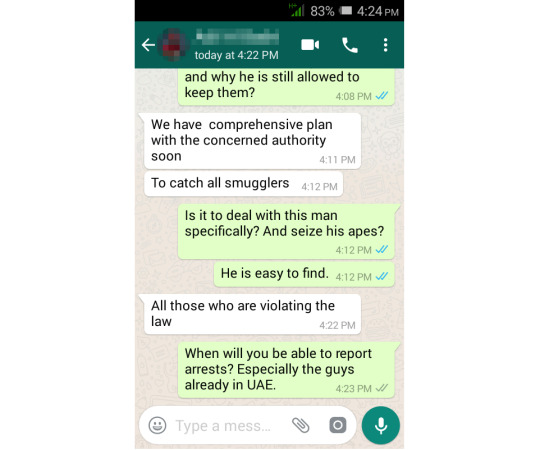
A sincere promise? Or a tactic to get rid of a bothersome animal defender? There are reasons to be cynical. The United Arab Emirates like to project the image of a country going through a legal evolution. They’ve acknowledged the animal trafficking crisis for years, while asking for patience because they said they lacked the legal tools to tackle it.
That’s an odd excuse from a country that built the world’s tallest skyscraper and modernized every public service from mass transport to health care. We’ve been to UAE and didn’t notice any lack of zeal when it came to enforcing laws related to parking, vehicle standards, public morality, store opening hours or any number of other behaviors. It’s a rather tightly run place and it finds the resources to enforce what it feels it needs to enforce.
Foreigners on UAE soil have been arrested for offenses as petty as sharing a Facebook post. Meanwhile, a small circle of UAE citizens and their favored friends are holding onto menageries of endangered and illegally acquired animals that must make the country one of the world’s worst offenders proportionate to its population - if not the worst.
Do they really need more time to fix this? The inconvenient truth is that, since 1990, UAE has had all the legal framework it needs, not only to prevent animal trafficking but to repatriate trafficked animals to their countries of origin.
Sign and forget
That was the year UAE joined the Convention on International Trade in Endangered Species of Wild Fauna and Flora (CITES). The UN-sponsored convention isn’t a joke - countries that join it are expected to follow the rules to ensure that endangered and magnificent animal species like chimpanzees and orangutans don’t end up as abused, disposable house pets.
Yet that’s exactly what happened in UAE. The country didn’t take CITES seriously and there is ample evidence on social media (like the image below) to support that idea. It would be totally wrong, however, to treat the present mess as an irreversible fait accompli. The convention has a clause - Article 8 - that obliges member states to seize animals imported in contravention of the rules and repatriate them to their countries of origin.
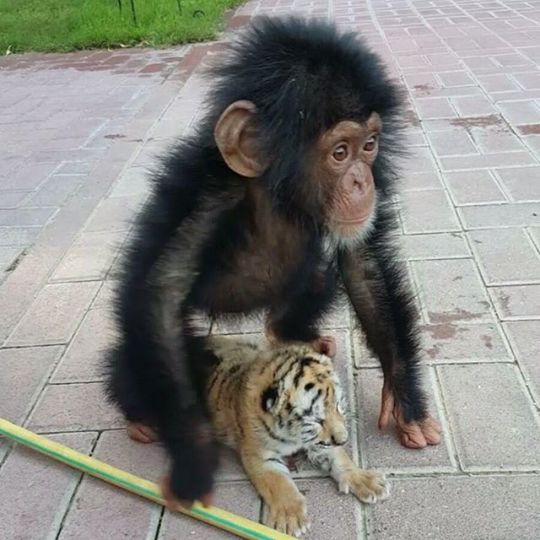
It bears repeating again: UAE has for 27 years had the legal framework to regulate the inflow of illegal species and to send home the ones languishing in local captivity. The government’s failure to meet its convention obligations is a national shame worsened by the fact that, unlike Third World countries, it’s never lacked the money or boots on the ground to enforce CITES rules. UAE’s long and drawn out journey to having laws to supposedly enable compliance with the rules looks more like an effort to avoid complying.
Various theories have been spun to explain this foot dragging. A popular one, and the most credible, is that a crackdown would implicate people high up in UAE’s social and political hierarchy. Wealthy menagerie owners like this one would lose their anonymity and face awkward questions as to how they obtained their apes without CITES paperwork. Naturally they’d try to cleanse themselves by passing the blame upward.
Animal amnesty 2018
Is the glass half empty or half full? We hope the communication we received from UAE is genuine and a crackdown is finally imminent. Dozens of apes are stranded there and they need to go home to sanctuaries in Africa and Asia. That’s not even to mention the other endangered species involved. But it’s probably going to take more of the foreign pressure that UAE so dislikes. We want the first apes released in 2018 and, anticipating the many obstacles that could still be thrown up, we at this blog are reaching out to eminent members of the ape conservation community and asking them to keep the pressure up.
The United Arab Emirates are good at the talk - just look at the image below. Now we ask them to walk the walk.

#animal trafficking#animal rights#animal cruelty#animal rescue#animal abuse#wildlife trafficking#wildlife trade#wildlife crime#wildlife#uae#africa#animals#rainforest#ecology#conservation#apes#great apes#primates#chimpanzees#orangutans#instagram#social media#crime#animal crime
1 note
·
View note
Text
Saving Myanmar’s Elephants
by World Elephant Day guest blogger Ruth Powys
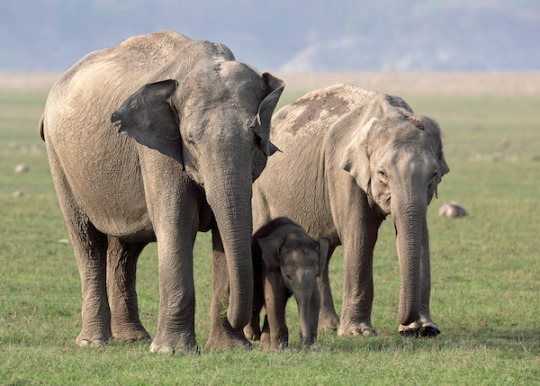
Saving Myanmar’s Elephants
By Ruth Powys
While a boom in the illegal ivory market is threatening the world’s African elephants, their lesser-known cousins across Asia are silently facing a similar fate.
The illegal trade in animals and their body parts has been going on for decades. Black markets have been brimming with pangolin scales; elephant ivory, tiger skins, rhino horns and exotic pets for years, but more recently, a new fad has been emerging as Asia’s elephants are being poached for their skin. Hidden in the dense forests, Myanmar’s elephants are witnessing a drastic decline as they succumb to this growing, illicit trade.
Ranked the fourth largest global illegal trade after drugs, arms and human trafficking, illegal wildlife trade is a sophisticated business with an even more sophisticated distribution network. Mong-La in northeast Myanmar, a protectorate area of China well-known for gambling, prostitution and illegal trade of wildlife products, is one of the main destinations where elephant ivory, bones and skin are sold.
Elephants are endangered across Asia, with only an estimated 40,000 remaining in the wild today – a 90% decline compared to a century ago. Myanmar retains some of the largest areas of habitat left for Asian elephants and possibly the third largest (yet declining) population of wild Asian elephants after India and Sri Lanka. The country now has as few as 2,000 wild elephants and 6,000 timber elephants left. It is estimated that if the current rate of poaching in the country continues, Myanmar’s elephant population could soon be completely wiped out.
In 2015 alone, 36 wild elephants were reported to have been killed, with experts believing that many poaching incidents went unnoticed. Last year, Elephant Family – an NGO dedicated to protecting the Asian elephant – funded one of the first ever undercover investigations across Myanmar and China to unravel the growing trade for elephant skin and make this issue known. The findings revealed that elephant poaching in Myanmar is indeed increasing, fuelled by the demand from neighboring China. The skin is cut up, dried and sold on the black market believed to ‘treat’ a number of ailments such as eczema and digestive problems. The investigation also revealed that the skin is being cut into cubes, dried and carved into polished beads for jewellery.
While elephant ivory remains the most valuable part of an elephant, the growing demand for elephant skin and other parts continues to drive up the demand for elephant poaching in Myanmar, further decimating its already fragile elephant population. This year alone, a herd of 20 elephant carcasses including calves, were found in two sites across Myanmar’s forest stripped off their skin.
But Elephant Family and its partners are determined to crackdown on poachers and stop the trade.
What can be done?
Last October, we presented our investigation findings at the CITES[1] Conference of Parties (CoP17) in Johannesburg to make this issue known, calling on range states to tighten procedures to stop trade. Our ongoing efforts were made visible when our calls to action were successfully incorporated and passed at the Convention.
Our next steps are to build the capacity of regional police, customs and wildlife officials within targeted countries in order to better detect and prosecute cross-border and wildlife trade. If Elephant Family can continue to secure a war chest of funds and carry out further investigations to establish the full extent of this abhorrent trade, we can invest in stronger intelligence and understand more clearly who is trafficking and supplying elephant products, allowing us to crackdown on end markets once and for all and sources fuelling the trade.
So this week, to commemorate World Elephant Day, let us shine a multi-coloured spotlight on Myanmar’s elephants to raise awareness and much needed funds for this little known yet growing trade -a threat that has never been greater.
Our combined efforts can help save Asia’s elephants and stop the trade from escalating up to the level of elephant ivory and rhino horn, while we still have time.
To find out more about the illegal trade in elephant skin and how you can help, visit http://elephant-family.org/what-we-do/campaigning/elephant-skin
[1] Convention on International Trade of Endangered Species

0 notes